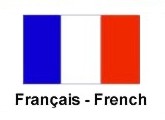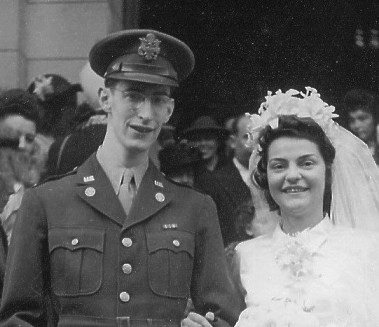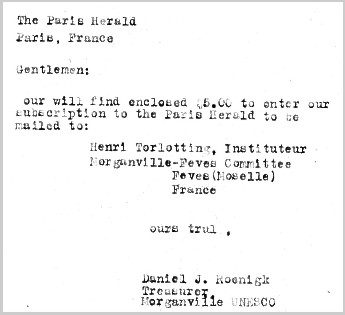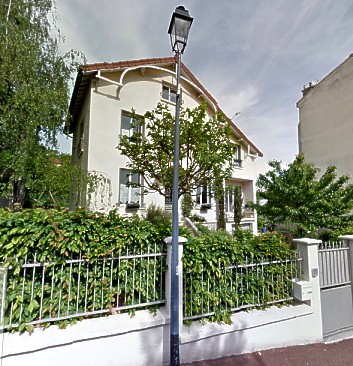While there can be little doubt that the people at the program in Fèves that June day were probably dressed in their
Sunday best, it is also clear by looking at the photographs that the severe conditions present just a year before
had eased. The children appear to be happy and healthy.
But while the crisis had passed, times remained difficult. Loved ones were lost during the fighting. Food and
materials were often not available. Many homes were still in disrepair. Regardless of age, all had to do their part to
endure.
The difficulties still facing some in Fèves can be seen by a letter prompted by a former Morganville resident
then living in Emporia, Kansas. While most of Dr. Daniel Schaffner's siblings had moved with his parents to
Morganville many years before, his brother John remained behind in Ohio where he was a professor at Ohio State
University. John's son - also named John - was in the service during the war. In 1945, he married French woman
Susan Landon in Paris.
When the Morganville committee decided to send CARE seed packages to Fèves, Dr. Schaffner paid for one and had
Susan write a letter as well. The letter she received in response from Alfred Roget provides insight on conditions and
their life in the French village.
John and Susan Schaffner
The letter was published in the Morganville Tribune on June 30, 1949.
We don't know how to express our thanks for your great generosity from which we so gladly benefit.
The parcel arrived just in time as we had not been yet at the grain merchants to buy our seeds for the garden, which
saved a nice lot of money. We immediately sowed most of the seeds and as the weather was right, the garden is quite
grown by now. Dear Mr. and Mrs. Schaffner, thank you a thousand times.
We want to give you an idea of our situation: two old people, living in a wooden shack, and in summer we almost
suffocate and freeze in winter. I, the husband, am 78 years old and my wife will soon be 80. We have been married 53
years, and had three children, two boys and a girl. One of the boys died in a German concentration camp as did our
daughter's husband. She is now a widow with two little girls to raise.
On September 4, 1944 at eleven a.m., a gun thumped on the shutters and at noon we had to be evacuated, we could not
take the horse or carriage. We left with just what clothes we wore. We were lucky. We stayed at Metz during three
months of misery and hunger.
On November 19, Patton's 3rd Army entered the city to free us from Hitler's gang. We were at the city's gates when
the first American boys entered. Dear Mrs. Schaffner, What Joy!
When we came back to our home village where we had had a beautiful little home, the result of our labor and savings,
there was not a stone left of our home. Dear madam, we have lived through some very sad times. As war damages, we
received 58,500 francs, but what can we buy with the prices of everything? We bought, as we went along, a stove, a
bed, a linen cupboard, a kitchen cupboard, three chairs, a couple of sheets, two pillow cases, a suit of clothes for
me, and the money is gone.
I have a social security pension 5,800 francs [about $19.00 Mrs. Schaffner added - about $190 in 2015], but
for two people, we have to go easy. We are still working in the fields more than our strength allows us.
Dear Mr. and Mrs. Schaffner, we only have to thank you again, a thousand times for your personal gifts and the gifts
of generous Morganville which were bestowed on the inhabitants of Feves.
My two granddaughters, children of my widowed daughter, have received some pretty clothes which fit them, as
tailored garments do.
May God keep your generous uncle in good health, as you told me he had been ill, so he can bring joy and happiness
to the underprivileged French.
Dear families, please accept our thanks and wishes of sincere friendship. My wife, daughter and granddaughters join
me in all these wishes.
Confident their efforts were making a difference, the people in Morganville pressed on with their mission. On June 16,
Roenigk sent a check to the "Paris Herald" - international edition of the Herald Tribune - to secure a subscription for
Torlotting.
A glance at the August 4, 1949 balance sheet for the
Morganville-Fèves Committee reveals that after the expenses associated with the pageant were subtracted, a bit more than
$1,000 - approximately $10,000 in 2015 funds - had been collected. The purchased goods, and costs associated with shipping,
amounted to almost $800, leaving a bit more than $200 with which to carry on.
Roenigk's newspaper subscription letter.
Note: the typewriter had a faulty
"y" key.
But the mission was changing. The Marshall Plan, combined with French government programs, were easing the most difficult problems the citizens of Fèves were facing. And as they eased, the people of the village wanted to show their appreciation in some tangible way that was not as fleeting as a radio program. There was a hint of what they had in mind in a September 12, 1949, letter sent from the Utley home in Paris to Roenigk. The Torlottings were visiting with the Utleys, as were the Bazins. Most of the letter was from Henri, translated into English by Yvonne. The following paragraph was near the letter's end.
It may be premature to mention it, but I have an idea that it would please the Morganville people to have a souvenir from their friends in Fèves and when Mr. and Mrs. Utley come to visit us towards the end of September (we hope), I intend to submit the idea to them, and to give you more particulars thereafter. We have been constantly receiving presents and, although we cannot reciprocate in the same manner, we would like you to have something which will remind you of our deep gratitude and of our fine friendship.
The letter also references a large shipment from Morganville of sugar, cocoa, and rice, eight packages in all, that had arrived in the neighboring village of Maizières-lès-Metz just as the Torlottings had left for Paris. Since Henri was a member of the Fèves committee, the distribution was delayed until he returned.
But that return was delayed more than anticipated when it was learned that Morganville native August Kolling Jr. would
arrive in Paris on the 15th of September. Kolling was on a trip sponsored by an American farm organization. He was one
of the people in Morganville who had been skeptical of his hometown's efforts to help Fèves. He felt there were plenty
of people at home who needed help.
Billie added a few handwritten comments at the letter's end. She mentioned that they were really enjoying the Torlotting
visit and their guests seemed to be having a wonderful time as well. Billie said they had "taught the Torlottings to
play Pachisi and he [Henri] insists he will say, 'How do you do, Mr. Kolling' when he meets August, instead of the
usual French 'Bonjour.'"
A 2015 photo of the Utley home in 1949 at
34 Rue Boris Vildé, Fontenay-aux-Roses, France




